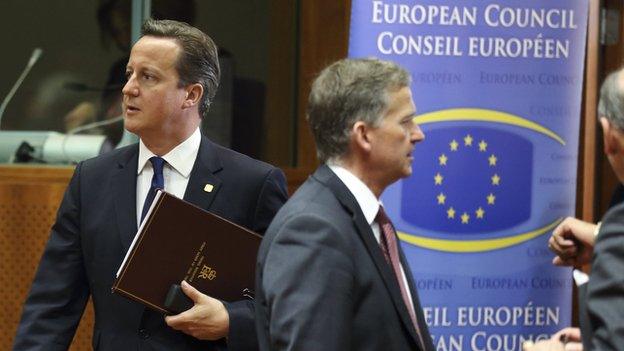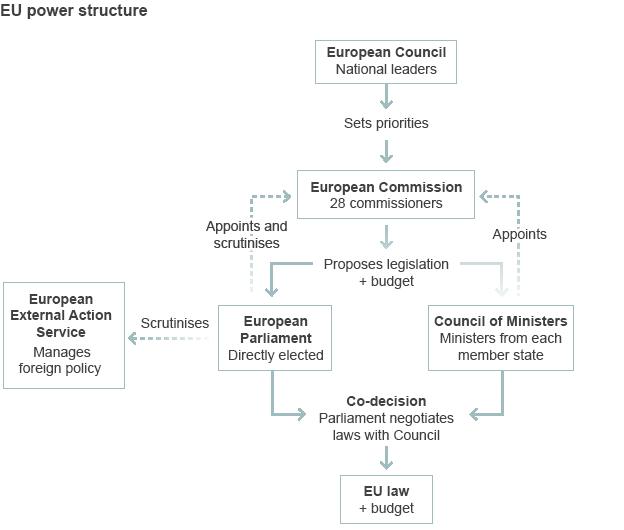MEPs elect Jean-Claude Juncker to head EU Commission
- Published
Tory MEP Syed Kamall and UKIP's Nigel Farage criticise the former Luxembourg prime minister.
A majority in the European Parliament has approved former Luxembourg PM Jean-Claude Juncker to be President of the European Commission.
He got 422 votes out of the 729 total cast in the secret ballot, despite strong opposition earlier from Britain.
He told reporters in Strasbourg he was prepared to discuss repatriating some powers from Brussels to member states.
A firm believer in EU integration, he will succeed incumbent Jose Manuel Barroso of Portugal in November.
In a speech to MEPs, external, he pledged the Commission would be a "political body", not just Europe's civil service.
He got sustained applause when he said the euro "protects Europe".
Mr Juncker was well over the 376 votes minimum that he needed. There were 250 votes against him, 47 abstentions and 10 spoilt ballots.
Mr Juncker, a veteran of Brussels deal-making, was lead candidate of the centre-right European People's Party (EPP), which won May's European elections. He played a key role in the eurozone bailouts.
The presidency is the most powerful job in Brussels. The Commission drafts EU laws, oversees national budgets, enforces EU treaties and negotiates international trade deals.
On Wednesday EU leaders are expected to nominate a new EU foreign policy chief, to replace Baroness Ashton.
Eurozone veteran
At his news conference, Mr Juncker reiterated previous comments that any repatriation of powers would be a matter for renegotiation with UK Prime Minister David Cameron and other heads of government of EU states.
But he said he would be prepared to make a "fair deal" with Britain.
As chair of the eurozone finance ministers, Mr Juncker steered the massive bailouts for Greece, Portugal and other struggling countries at the height of the euro crisis in 2010-2012.
He likened that role on Tuesday to "trying to keep a burning plane in the air while repairing it - you burn your fingers sometimes".

David Cameron (left) had tried unsuccessfully to block Mr Juncker's nomination
Elsewhere in his speech he said:
The eurozone should create a joint budget, separate from the EU budget, to help countries making difficult structural reforms
The EU needs a 300bn-euro (£238bn; $408bn) investment plan to boost growth and create jobs
"Maximum transparency" is needed in the EU's free trade negotiations with the US, to allay people's suspicions
The EU "should not Europeanise every tiny problem" but "deal with the big tasks"
The troika group - in charge of EU bailouts - must be made more democratic, with more parliamentary scrutiny
EU rules on free movement of workers will not be changed - but national authorities must tackle abuses
When he sought to argue that the euro represented monetary stability, UK Independence Party MEPs shouted "rubbish".
Last month, Mr Juncker won the backing of 26 out of 28 leaders of the EU.
Mr Cameron - supported by his Hungarian counterpart Viktor Orban - called the move "a serious mistake" because Mr Juncker, 59, was too much in favour of closer political union and might block EU reform. He pushed for - and lost - a vote on Mr Juncker, breaking with tradition.
In the past such appointments were made by the EU leaders - meeting in the European Council - by unanimity.
After the European Council vote Germany's Chancellor Angela Merkel said there would be a review of how the Commission president was nominated - but only after the new Commission team was in place.
Mr Juncker's supporters value his record of consensus-building and commitment to EU integration.
Under new EU treaty rules, the leaders have to take account of the European election result when nominating a Commission chief.
In the coming months, the other 27 new members of the Commission - one from each country - will be appointed. The EU will also appoint a new foreign policy chief and new president of the European Council.

